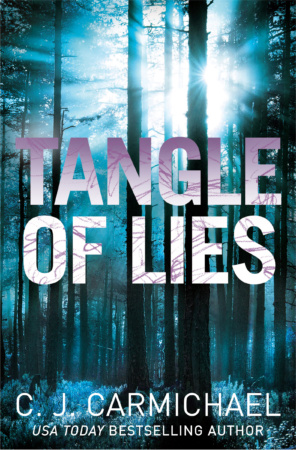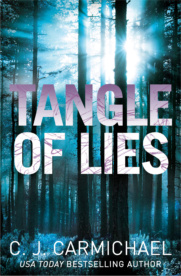Start reading this book:

Share This Excerpt
April 20, 2020
“My name is Fern. Fern Sinclair.” Her voice sounded tinny and false as it echoed in the cab of the U-Haul truck, but she had to keep practicing. Get used to the name. The sound of it. The way the words felt on her tongue. It was a pretty name, at least.
The view out the windshield was not so pretty. Vast fields, flat, and soggy and dull. Mid-April was not an inspiring time to cross the prairie. The lakes, rocks, and forests of the Canadian shield had been more interesting, but she had been too tense to enjoy anything in the early days of her trip. Now, with over two thousand miles between her truck and Notre-Dame-des-Pins she could feel not just her muscles, but her mind, relaxing.
At forty-three it wouldn’t be easy to start a new life. But it had to be done. In her dreams she still heard the patients moaning for water, for food, many of them steeped in their own excrement. It was how you would imagine a concentration camp. Filled with the elderly and demented.
She’d been twelve hours into an interminable shift when a local TV station reported that the Quebec government was going to step in and take over the administration of several care homes in the province, including the one where she worked, the Maison des Quatre Saisons. In addition, the situation was so dire, the federal government was sending in the Canadian Armed Forces.
She cried when she heard the news. Thank God someone was finally going to help. By then over fifty of their residents had died of covid, and many more were gravely ill. She herself had been felled by the virus in mid-February, though she’d never been tested to confirm, she knew it was covid. She’d gone to work anyway, because there were no backup caregivers to go in her place.
As glad as she was that help was coming, she also knew the time had come for her to leave. At some point there was going to be an investigation or inquiry into what had happened, and she did not want to be there for that.
Her last act in the Maison de Quatre Saisons—or as she had started to think of it, La Maison de Morte—had been to walk silently in her rubber-soled shoes to the room of a fifty-two-year-old female suffering from early-onset Alzheimer’s. The woman had been admitted two years ago and was in the final stages of her disease. Recently she’d started coughing and was now exhibiting a fever. Though she hadn’t been tested, it was almost certainly covid. Over the two years she’d been living in the Maison des Quatre Saisons, this woman had only a handful of visitors. Not that it mattered now. Even patients with lots of attentive family members were dying alone. No visitors permitted.
She found the patient coughing and tossing restlessly in her bed. Her untouched breakfast, lunch, and dinner trays were stacked on the table by her bed. No one had the time to feed her, and she was too far gone to do it herself.
“Wh—hack, hack—who are you?” the woman demanded, her voice a dry rasp.
“I’m your caregiver. I’ve come to look after you, dear.” Though she was not authorized to administer medication, she took the ibuprofen sitting in a small paper cup alongside the uneaten food and offered it to the woman along with sips from a carton of apple juice. The woman drank greedily, sloppily, juice trickling down her chin and falling to her soiled nightgown.
When the woman was finished, she went to the closet in the corner of the room and selected a pair of clean sweatpants, a warm fleece top and some socks. Then she filled a basin with warm soapy water and gave the woman a sponge bath. The patient needed a good soak in the whirlpool tub—but these days no one had time for that. As she stripped off the soiled sheets, she wished for a better mask and protective shield to protect her from the disgusting fumes.
Once the patient was settled in her clean bed, in fresh clothes, she put a glass of water within easy reach and then turned the television to a cooking show, one that the patient had seemed to enjoy in an earlier stage of her disease. “How’s that, dear? Look interesting?”
A series of coughs was her answer.
She tossed the dirty linens into an overflowing laundry hamper, then turned her attention to the real purpose of her visit—the patient’s closet. Stuffed into one of the patients’ leather loafers—which she never wore anymore—was a slim wallet. Quickly she transferred several of the small, plastic cards into the back pocket of her uniform.
On her way out she paused for a final look at the patient. “Thank you, Fern.”
She hadn’t submitted a formal resignation at work, nor had she given notice to her landlord, or informed any of her colleagues or neighbors that she was leaving.
She simply rented a U-Haul and packed all her stuff into it—including the cash her father had kept in his various safe spots—under the mattress, at the bottom of the freezer, inside the flour canister. She had that plus the shockingly high balance in their joint savings account. The money had come from the sale of property he’d inherited from his father, a lifetime ago, before her mother deserted them. Her father had always insisted the money wasn’t to be touched. A genuine miser, he wouldn’t even let her invest it. So, it sat there while they lived on his government checks and her minimum-wage salary.
Her car, a ten-year-old Honda Civic, she sold to a neighbor’s son who had just gotten his driver’s license. And that was it, the last of her ties to her old life severed.
She would move west, to the mountains, use Fern Sinclair’s Quebec driver’s license to apply for a new British Columbia one. After that she would be able to open a bank account and apply for a credit card, all in her new name.
She tried to argue away the guilt. What constituted a bad person anyway? One wrong act? Two? Stealing the dying Alzheimer’s patient’s ID cards had been illegal, but had it been bad in a moral sense? Fern’s identity had been lost long ago to her disease.
And now a new Fern Sinclair was born.
End of Excerpt










